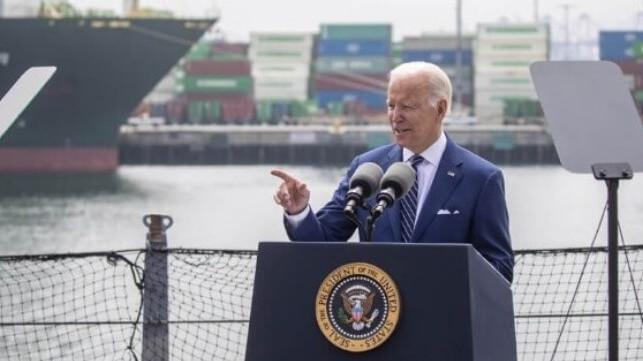U.S. to Invest $4B to Electrify Ports and Reduce Truck Emissions

The Biden Administration announced an additional $4 billion in funding for new programs that are designed to support the electrification of U.S. ports as well as to reduce emissions from heavy-duty commercial vehicles, including those used to move cargo in and around the ports. The administration highlighted the latest programs as part of their overall $17 billion investments to improve the country’s ports and waterways.
The programs range from efforts undertaken by the Department of Transportation and its Maritime Administration and Federal Highway Administration with the newest programs to be administered by the Environmental Protection Agency. Highlighting the programs, the government said they are part of an overall strategy to strengthen the U.S. supply chain and lower costs for the American people by making ports safer, cleaner, more efficient, and more reliable.
The EPA is seeking public input to inform the development of two new programs. The Clean Ports Program will invest $3 billion in technologies to reduce pollutants and emissions at U.S. ports. The goal is to support the development of zero-emission shipping. The funding will be available to help develop zero-emission port equipment and technology. The program will also help ports develop climate action plans to reduce air pollutants.Funding for the new programs comes from the Inflation Reduction Act signed into law in August 2022.
The second program is the Clean Heavy-Duty Vehicle Program through which the EPA will invest a further $1 billion to reduce vehicle emissions. This announcement comes a week after the California Air Resources Board (CARB) approved a first-of-its-kind rule that requires a phased transition toward zero-emission medium-and-heavy duty vehicles. In the first in the nation effort, California is requiring zero-emission trucking statewide by 2045 but begins by targeting the same heavy-duty trucks and yard equipment in the Biden plan. California starts a phase-out next year by only registering new zero-emission trucks and targeting the full transition for the trucks and equipment at the ports by 2035.
The EPA’s efforts on trucking are also designed to work with the Federal Highway Administration which last month opened applications for the first round of the new Truck Emissions and Port Facilities Grant Program. That program, which has up to $160 million currently available, calls for reducing emissions from idling trucks at the nation’s ports.
These are the latest investments in a series of programs launched by the Biden Administration for ports. They are citing MARAD’s $662 million in funding through their Port Infrastructure Development Program (PIDP) to modernize ports and help strengthen supply chains. MARAD will provide $2.25 billion over five years for upgrades impacting ports across the country.

that matters most
Get the latest maritime news delivered to your inbox daily.
The federal government is funding a broad range of port infrastructure programs. Long Beach, California was awarded $30 million for the replacement of diesel yard tractors with approximately 60 electric yard tractors, the construction of electric equipment charging infrastructure, and the installation of software equipment to streamline cargo-handling operations at the Middle Harbor Terminal. Jacksonville, Florida was awarded $23.5 million to be used for a range of electrified equipment, and Portland, Oregon was awarded $24.3 million to replace electrical components and enable future zero-emission operations.
In Honolulu, Hawaii the federal government is investing $47.6 million in electrified ship-to-shore cranes; acquisition of new equipment, and installation of solar panels on terminal buildings, while at PortMiami, Florida $16 million is being invested in electrification projects as part of a plan to convert the entire cargo movement chain to a carbon neutral operation. The EPA also reports that it has awarded Georgia Ports Authority over $9 million from the Diesel Emission Reduction Act (DERA) to reduce diesel emissions by upgrading and replacing older freight trucks, cargo handling equipment, and marine engines.
